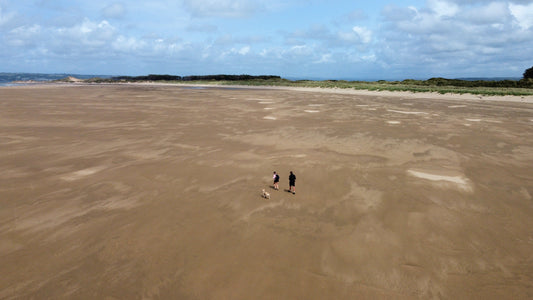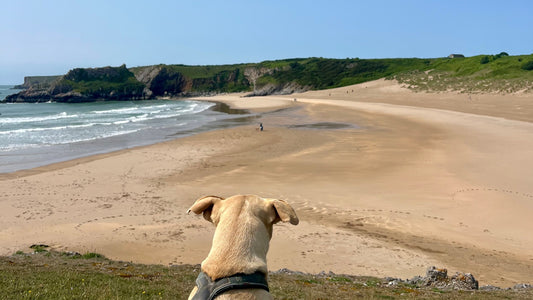
Van Life with a Dog: 5 Important Considerations
For us, van life with a dog is perfect! We go out and adventure with her and then come back and enjoy a cosy evening by a campfire. However, there are some important things you need to consider before you jump straight into travelling with your dog. 🐕
Table of Contents
1. Your living situation
Do you have somewhere for them to sleep?
Campervans come in varying sizes so where your dog is going to sleep is going to be different for everyone. Some people will have a fixed area for them to sleep such as under a fixed raised bed, whereas others might just have their soft bed that they move around. Of course, some people might just let their dog sleep in the bed, so you don’t really need to think about this too much.
Does your lifestyle align?
Having a dog can really dictate your lifestyle and this is especially true in a campervan. As well as yourself you’ll have to really consider whether places you stay, activities you want to do etc are suitable for your dog.
If it’s hot, you’re not going to want to leave them in the campervan alone and you’ll also probably need to try and keep them cool, so you can be a bit more limited with what you’re going to do.
Van life with a dog has different considerations based on the time of year. Summer is a lot easier with a dog in some ways because they don’t get wet and muddy and get your van all messy. However, you also have the difficulty of trying to keep them cool! It’s a good idea to have some way of creating shade, for example and awning. In winter, like we mentioned, it can be very hard to keep your van clean, so if you’re someone that wants to keep it pristine and white, well you might struggle.
Are they used to being in a driving vehicle?
It goes without saying that if you’re planning to do van life with a dog that they’re going to need to get used to being in a moving vehicle. For some dogs, this is easier than others. We were very lucky that Sandy got used to it straight away and simply lies down to sleep.
If you do have a dog that struggles in a moving vehicle, it’s a good idea to start getting them used to driving shorter journeys before you take them on a long road trip. The other thing to consider is whether there is somewhere for them to go while you’re driving, whether it’s a crate or strapped into a seatbelt on one of your chairs.
Where are you going to stay?
Depending on where you’re travelling, you might opt to wild camp, which is a perfect option with dogs. You’re likely to be somewhere you can park up and get them out for a walk and generally fewer people and distractions. One thing you might have to contend with is livestock, so be sure to have leads and a way of securing your dog to the van.
If you plan to stay on campsites, again you will need to research whether they accept dogs. Some campsites have a small fee to pay for dogs and it’s very likely you will need to keep your dog on a lead during your stay.
2. Where are you going to go
There are a few things to think about when you decide to van life with a dog. If you’re travelling in peak season then you really need to consider if where you’re travelling is going to be dog friendly. Popular places in the UK are likely to have dog bans during the summer months on the beaches so you need to check in advance. A great resource for this is the UK beach guide website.
If you’re planning to take your dog outside of the UK then there are some considerations, such as how old they are, vaccinations and exactly where you’re going to take them. We’ve written some helpful blogs about what you need to take your dog to Europe as well as the best places to travel with them.

3. Your dogs diet
If you’re going on a short trip, this might not be something you need to think about too much, unless they are on a raw diet. You can probably weigh out enough food for your time and keep it in a large box, all you need to do is make sure you have the space to keep it somewhere.
If your dog has specific dietary foods, if they are on a raw diet, you might have to think carefully about how you’re going to manage this. We have met people on the road that previously had a raw diet for their dog and while away they had some dehydrated raw food they could simply add water to. You might just have to do a bit of research.
Depending on where you travel, your options for food might be quite limited. We found that when we left Central Europe, fewer people had dogs as pets and therefore the options were lacking. This is something to consider as getting food delivered while travelling is not going to be very easy without a fixed address. Consider how much food you can keep in your van for your dog and how much you’re going to need.
4. Your dog’s behaviour
Just like humans, dogs vary a lot in their behaviour and it’s definitely something to consider before you jump into van life with a dog. When in a campervan, your environment is changing every day and sometimes where you stay is unpredictable.
If your dog is reactive, anxious, aggressive, or has any other particular behaviours you need to think about, it’s definitely worth considering if travelling with a dog is for you.
Personally, we think there's always ways around it and travelling with your dog is so rewarding, you just might need to think a little more. For example you might want to travel at a slower pace, find quieter camp sites or avoid busy cities.
5. Things to pack for van life with a dog
It's a good idea to be prepared for your dog. While, if you're travelling in the UK, you'd probably have no problem finding these things in the shops, it still makes you feel better leaving with everything you might need.
These are some of the things we always have in the van for Sandy.
- A microfibre towel robe
- A bed
- Food and treats
- Multiple harnesses (incase one gets wet)
- A collar
- Multiple leads (short and a long one for when she can’t be off lead)
- Water bowl including a collapsible water bowl
- Ball thrower and toys
- Flea and tick treatment (if you're travelling for a long time)
- Poo bags
- Paper work for you dog (if you're travelling abroad e.g. passport or UK health certificate)







